The Fantasy Football Scout Hall of Fame creates titans. It is the ranking system that allows James Egersdorff to justifiably refer to himself as the world’s number one fantasy football manager, and has turned an unknown, enigmatic Finn into – let’s be honest – a living legend.
In this article I aim to explore not only how the HoF works, but – by contrasting it with a few alternative HoF tables – why it remains so celebrated amongst FPL cognoscenti.
Like all great inventions the HoF was born out of necessity – in this case the desire to win a mini-league! Created by Chris Atkinson (aka RMT’s Professor) in 2011, the HoF was initially a tool for him to improve his FPL management skills. Chris wanted to learn from the cream of the crop, and devised the HoF as means of identifying them.
The reason I started the HoF is essentially because I had money on myself to win a work FPL league! Alongside building the Rate My Team model, I wanted a way to keep a track on which players were owned by which managers.
– Chris Atkinson, the Hall of Fame creator
Originally the HoF had a dual purpose. Not only did Chris want to identify the best managers, he also wanted to know which players they had in their squads.
I then looked at percentage ownership of players in these groups. For example, I remember Elmohamady from Sunderland was barely owned by the weaker and middle managers (maybe 1%) but as high as 15% owned by the best managers. This made me feel better about having him in my squad.
I wrote a script that scraped the teams of the top 15,000 and ranked those managers into the top 5000, middle 5000 and bottom 5000 by doing essentially the same as what the HoF does when it ranks managers.
– Chris Atkinson
Something similar exists today on Reddit, it looks at player ownership among veteran managers compared to the crowd. However a HoF version would add value due to the recency weighting it uses when rating managers (more details later in the article). I think this would be a great new feature for FFS to consider.
A LOOK UNDER THE HOOD
To start with I’ve prepared a table showing the underlying numbers behind each manager’s HoF rating. Rather than use rank, the HoF divides a manager’s points total for the season by the ‘maximum score’. The maximum score is defined as:
An 80% mix of the average of the top five scores that year and a 20% mix of the average score that year.
It’s understandable that these ‘points divided by max score’ numbers are not shown in the HoF, as they are fairly meaningless to the average manager. It is much easier to relate to a rank, which serves as a simplistic barometer of a manager’s capability.
However ranks are not as effective for comparing different seasons. One simple reason for this is the ever increasing number of people playing FPL, which makes it harder to achieve a high rank.
To make the table a little easier to read I’ve added some basic conditional formatting to the numbers – green highlights a good season, red a not so good season.
You’ll notice there is a general pattern of more green coloured boxes on the left of the table, with more pink and red boxes to the right. As stated on the HoF page:
The latest season [is] weighted the heaviest and each corresponding season weighted at roughly 80% that of the previous season.
WHO ARE THE BEST ACTIVE MANAGERS?
Unlike the Boxing Hall of Fame or the Rock and Roll Hall of Fame, the FFS HoF is not about paying tribute to past greats. It’s about the here and now. Who are the best active managers playing the game? That’s the question it sets out to answer. Chris explains:
I don’t want to copy the team of a manager who has had a glorious past five years but has given up this year and still has injured players in their team!
The game is constantly evolving with tweaks to the scoring and the addition of new chips, plus access to an ever increasing number of stats to help managers make decisions. Not only this, but football tactics have developed too with wing-backs, false 9s, and player rotation more common today than they were ten years ago.
What’s impressive is the number of managers in the HoF who have remained consistent despite the changes. James Egersdorff, Mark Sutherns, Ville Rönkä, and Kenneth Tang stand out as managers who were as excellent in the early years of FPL as they are today.
A quick note on the colour formatting and number rounding: Rick Beamish, for example, his score of 1.00 last season is in fact 0.997758882 (rank 527) whereas his score of 1.00 in 2013/14 is 1.002676184 (rank 241) this explains the different colour formatting despite the same rounded number.
CONSISTENT GREATS
The next table removes the recency weighting. Instead of the ‘HoF Rating’ the table is sorted by a ‘Global Rating’, which is an average score of all the seasons a manager has played FPL. Managers must have more than four years data to feature.
The most consistent manager according to this table is Owen Walker, who moves up from fifth place in the HoF. Other notable movers are the Finnish Legend himself, Ville Rönkä, and Kenneth Tang.
It’s no surprise that Ville should rank so highly in a table that favours success over a long period of time given his famously patient approach. A recent article in Finnish includes quotes attributed to FPL’s equivalent of Keyser Söze, the mythical crime lord in The Usual Suspects – “The greatest trick the Devil ever pulled was convincing the world he didn’t exist”. That’s a line from the film, not Ville Rönkä. Below is an English translation of a quote from Ville:
You need to be patient. Rushing and switching players back and forth because they didn’t deliver, is probably the biggest mistake.
– Ville Rönkä
One reason Jay slips to third in this table is that compared to his HoF rating of 98.02, his Global rating of 97.71 is not boosted by his exceptional score of 1.02 (rank 105) in 2016/17. The recency weighting applied in the HoF has no impact on his Global rating.
MISSING SEASONS
There are noticeably more grey boxes in this table compared to the HoF. Unlike the HoF rating, seasons when managers weren’t playing FPL are ignored completely and therefore don’t affect the Global rating.
The HoF, on the other hand, fills in the blanks – it creates a rating for the missing seasons. This has a negative impact on Owen’s HoF rating. Comparing Owen’s missing seasons with Jay’s early years we can perhaps understand why Owen is not ranked above Jay in the HoF.
| Owen | 0.92 | 0.92 | 0.90 | 0.89 | 0.88 | 0.86 |
| Jay | 0.99 | 0.95 | 1.01 | 0.94 | 1.00 | 0.97 |
There are two ways of looking at this aspect of the HoF:
1) Jay has been playing FPL to a very high standard for twice as long as Owen, surely that should be reflected in the HoF?
2) Owen has six seasons under his belt, all excellent, why should he be marked down simply because he hasn’t played as long as Jay?
It should be noted that the impact of Owen’s missing seasons is lessened due to the recency weighting used in the HoF. Each season is weighted at roughly 80% of the previous one. So going back six seasons, the effect of those missing years has been greatly reduced.
MOST EXCEPTIONAL SEASONS
If the previous table focused on the Arsenal’s of the FPL world – consistently securing Champions League or Europa League qualification without actually coming close to winning the Premier League – the next table looks at the Chelsea’s – winners one year, 10th the next.
It follows the logic proposed by Nick (aka Triggerlips) amongst others, that bad seasons should be ignored because to be the best you need to take risks. This table, therefore, ranks managers according to the number of exceptional seasons they’ve had.
I’ve defined exceptional as the number of times a manager has achieved a ‘points divided by maximum score’ greater than 1.00. After this the table is sorted by scores between 0.98 and 1.00, and finally by the Global rating.
According to this table Kenneth Tang is the most successful FPL manager with three scores above 1.00 and a further three scores above 0.98. His three monster scores all came in his first four seasons of playing FPL – 1.01 (rank 158), 1.02 (rank 150), 1.00 (rank 132) – followed by three incredibly high scores in his five most recent seasons – 1.00 (rank 384), 0.98 (rank 2,881), 0.99 (rank 1,187).
One reason for Kenneth’s early success might have been his foresight in developing a prediction model before stats were as prevalent in the game. Last May, in a comment on FFS, he explained:
I have my own prediction model, and took quite some time for me to do it myself many seasons ago. Now FFS and data analysis around are doing great. They are my great reference to work on. My own model will raise the importance of fixture and value, in view of a longer period of GWs.”
– Kenneth Tang, former Career Hall of Fame number one
Fantasy Football Scout’s Mark Sutherns ranks second in this table, although his monster seasons are more spread out when compared to Kenneth’s – 1.01 (rank 268) in 2008/09, 1.01 (rank 42) in 2014/15 and 1.02 (rank 115) in 2016/17.
WHEN HITS PAY
Another recognisable name on the list is FFS contributor and former Career HoF number one, Peter Kouwenberg (aka My Pretty Pony). Peter’s recent history is exceptional with two scores over 1.00 (ranks 138 and 129) and a further score over 0.98 (rank 289).
Although last year was by far his worst season – score 0.90 (rank 253,757) – it is not altogether surprising that a manager like Peter, or indeed another former Career HoF number one Ulrik Nylund, should have up and down FPL careers given their tendency to make a lot of transfers. Ulrik has been known to take 16-point hits and has already played his Wildcard this season.
For these two managers taking hits has proven to be a successful strategy but, as I speculated in my previous article, given that last season was notable for its low ‘Immediate Transfer Points’ it perhaps wasn’t destined to suit their style.
FPL CHAMPIONS
You’ll notice there are more red boxes dotted around compared to the previous two tables in this article. This reflects a greater range of scores because bad seasons matter less. H J Saarinen ranks 12th with two seasons over 1.00 and a further two over 0.98. This is despite a score of 0.52 (rank 2,537,859) in 2011/12. H J Saarinen followed this poor season with an exceptional one, coming 152nd in 2012/13.
This is the pattern you might expect of someone who actually wins FPL, and it describes current champion Yusuf Sheikh to a tee. The season before be claimed the FPL crown Yusuf managed a distinctly unimpressive rank of 1,030,675 and he had never previously been higher than 362,971. Is he just a ‘one-hit wonder’?
While it would be unkind to refer to former champions Tom Fenley (2013/14), Simon March (2014/15), and John Frisina (2007/08) as ‘one-hit wonders’, all three only have that one truly exceptional season in their history. Despite gaining top 10,000 ranks, none have crossed the 0.98 threshold in any of their other seasons.
The ultimate definition of a one-hit wonder is Dimitri Nicolaou, who won at his first attempt in 2015/16. To prove the point he followed that up with a rank of 1,031,214. However not all past winners fall into this category.
Australian Sir Moult, winner in 2008/09, came 516th (score 0.99) in 2013/14. Chris McGurn, winner in 2010/11, had two more excellent seasons beating the 0.98 mark in 2012/13 (rank 858) and 2008/09 (rank 1,517). Likewise Ben Crabtree, winner in 2016/17, enjoyed excellent seasons in 2011/12 (rank 353) and 2010/11 (rank 1,369).
CAUTIONARY TALE
However it’s Matthew Martyniak, winner in 2012/13, who is the most successful former champion.
Ranked 11th in this table, Matthew has achieved one exceptional (1.01) and two excellent seasons (0.98 and 0.99) in addition to his victory. His first exceptional season came back in 2007/08 (rank 707) and his two excellent seasons immediately followed his victory – rank 995 in 2013/14, and rank 731 in 2014/15.
The pressure certainly wasn’t off after winning the FPL. It was actually greater than before, especially the following two or three seasons. Some of the pressure was good in regard to it helping me do well at the FPL game, but some of the pressure wasn’t so good and it became unhealthy.
– Matthew Martyniak, FPL Champion in 2012/13
In his book “Wasting Your Wildcard”, David Wardale includes quotes, anecdotes and stories about several past winners. Matthew’s story is a somewhat cautionary tale; if anything winning FPL had a detrimental impact on his life.
I was mentally and physically drained by it all. My mood, my actions, my thoughts in reality were being directly affected by my Fantasy life, my FPL team and its results, whether they were good or bad. It wasn’t healthy for myself and those around me.
– Matthew Martyniak
It’s an insightful read. Matthew’s story is a reminder that we shouldn’t lose sight of why we started playing FPL.
If I am to continue playing FPL, I am going back to my roots and playing it just for fun, enjoyment and for the friendship with others, that is the amazing FPL community.
– Matthew Martyniak
EXCELLENT AND CONSISTENT
The next table tries to strike a balance between excellence and consistency. The thresholds have dropped – the table is sorted by scores over 0.98, followed by scores between 0.96 and 0.98, and finally the Global rating.
Suddenly Ville’s name – absent from the previous table – reappears. His consistency is excellent without being truly exceptional. Perhaps this is a consequence of his risk averse approach?
Holding onto the number one spot for the second table running is Kenneth Tang – possibly the only FPL manager who can claim to be consistently exceptional. That he is ranked down in 11th in the current HoF is due to its recency weighting, as he hasn’t had a truly exceptional season for a few years.
Also deserving of a mention is Matthew Jones (aka Numb) as the manager with the fewest number of seasons (9) to make the top 20. Only two of Matthew’s seasons have been below the 0.96 threshold, and one of those was his very first season in FPL.
BEST NEW MANAGERS
The FPL equivalent of the Young Player of the Year award, the next table looks at the best new managers to be playing the game. Sorted by their Global rating, managers don’t actually have to be young to qualify but they must have no more than four years experience.
Ryan Lysaght’s first season saw him finish fifth in the Fantasy Football Scout Members League. Hugely impressive for his maiden season although not quite matching the debut feats of Dimitri Nicolaou. No doubt he’ll be hoping he doesn’t suffer the same fate as Dimitri in his second season.
Looking at this table, it’s perhaps easier to understand why the HoF accounts for missing seasons by generally marking them down. As good a start to their FPL careers as these top new managers have made, I don’t think anyone would consider them better than Jay at this early stage.
Nonetheless, future Hall of Fame stars could emerge from this list – who will take over from current top 20 HoF managers Owen Walker and Eivind Almhjell (six seasons each) as the new kids on the block?
One stand out name in addition to Ryan’s is Julian Gordon. Julian has two exceptional finishes (scores above 1.00) in his four seasons playing the game. He’s certainly one to watch out for.
DID CHRIS WIN HIS MINI-LEAGUE?
After going to all the trouble and effort of creating the HoF, you would certainly hope so.
I ultimately finished 61st in the world the year that I set up Rate My Team and the HoF – amazingly I didn’t win my office league and lost a 30 point lead on the final day of the season thanks to the exploits of Charlie Adam and Joleon Lescott amongst others!
– Chris Atkinson
It seems that even if you are smart enough to create the HoF, you are still not protected from the vagaries of Fantasy Football. According to David Wardale “Fantasy Football is a game of sweet science and skill wrapped in a sickly coating of luck.”
With apologies to Charlie Adam and Joleon Lescott, but the “sickly coating of luck” they served up no doubt had Chris vomiting all over his laptop. Chris, if it’s any consolation, you deserved better.


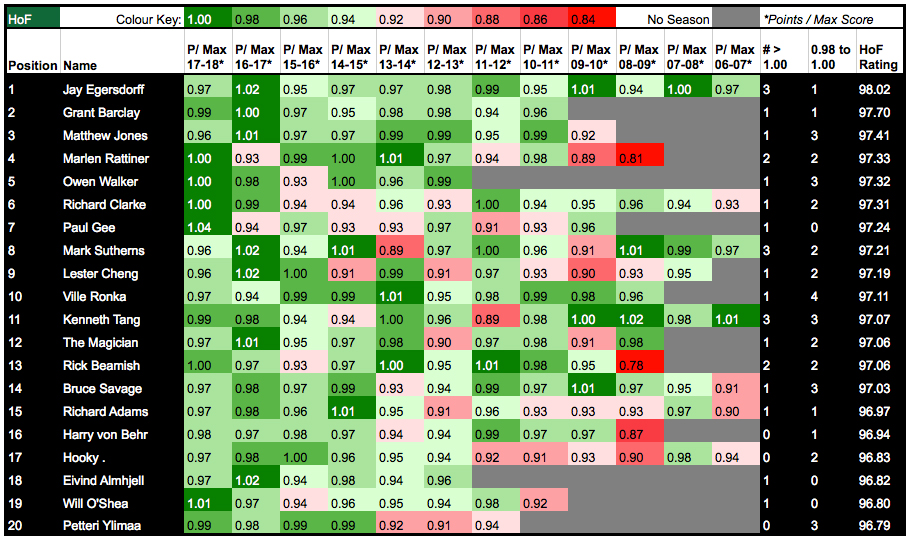
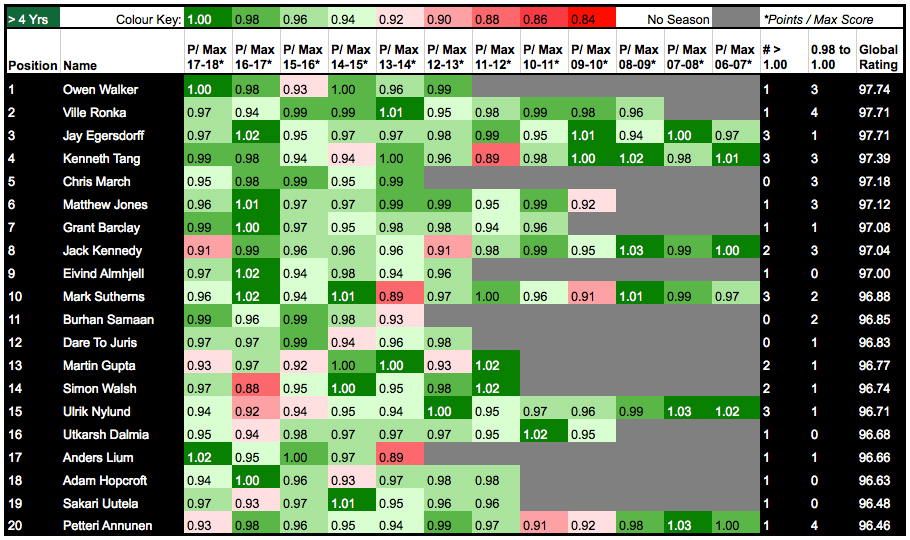
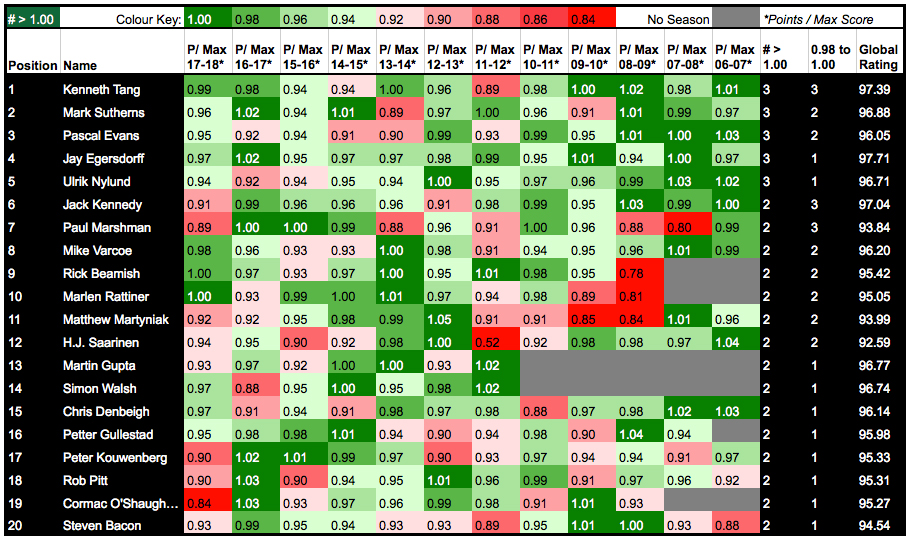
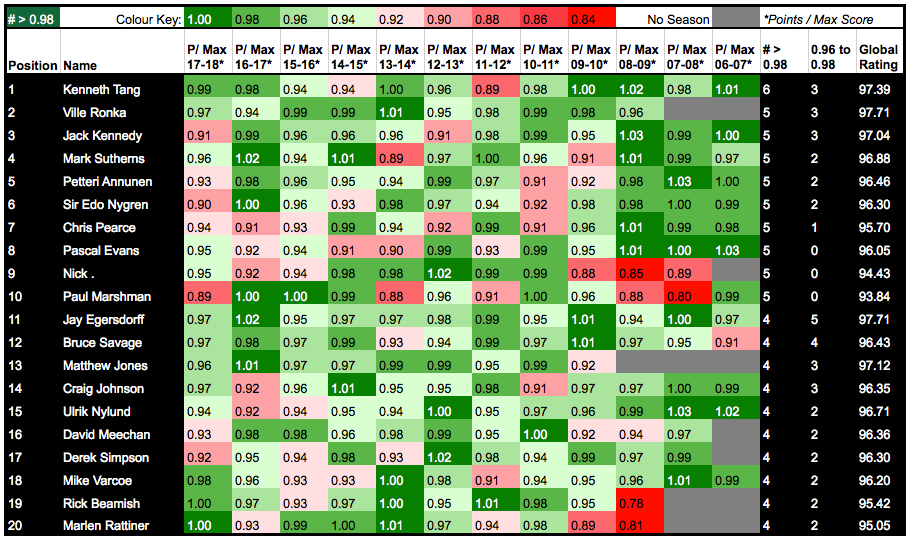
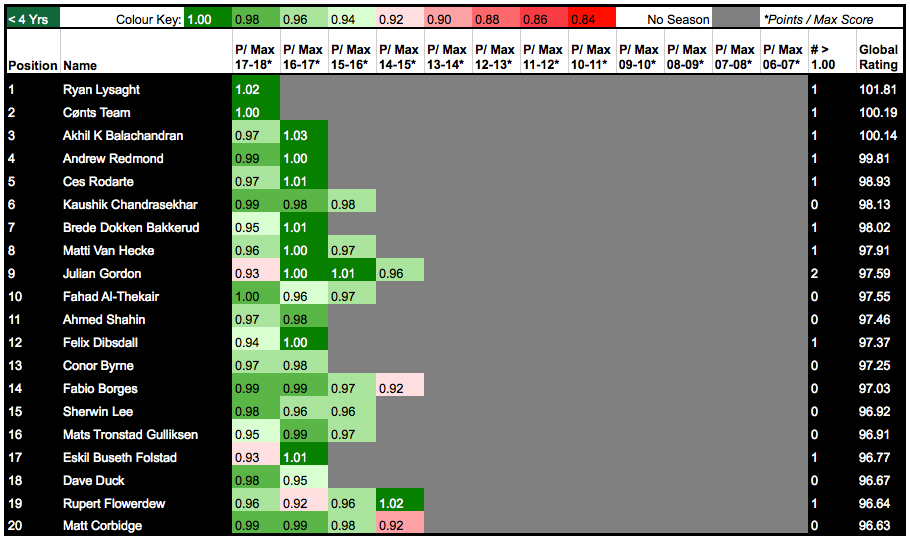



6 years, 5 months agoAmazing work TopMarx!
I think getting the balance right between long term and short term history is really interesting. The managers I try to emulate, or learned from most when I started, was the really consistent managers; though maybe not as spectacular as others they didn't have as many dips in form and consistently put themselves in a position to win and get a good rank.
This really helps see what it is that makes these managers different, and differently good! And it'll be good to see how the best new managers cope with the pressure 😀